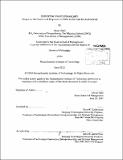Subverting value hierarchies : essays on the causes and responses to shifts in demand for authenticity
Author(s)
Hahl, Oliver (Oliver Douglas)
DownloadFull printable version (13.15Mb)
Alternative title
Essays on the causes and responses to shifts in demand for authenticity
Other Contributors
Sloan School of Management.
Advisor
Ezra W. Zuckerman.
Terms of use
Metadata
Show full item recordAbstract
This dissertation includes three essays on the causes and responses to shifts in demand for authenticity. In the first chapter, I answer the question: why do previously cast-off products, practices, or styles abruptly return to popularity? I use a mixed-methods approach in analyzing archival data on the case of venue design in Major League Baseball throughout the twentieth century. My analysis of the baseball industry, including comparison to the professional football industry (NFL) as a counterfactual case, shows that the re-emergence of a once popular, but long-forsaken style arose in response to fan concern over the increased prominence of an ulterior, mercenary motive for performance. I argue and show that this "commitment crisis" invalidated the prevailing popular style, and in its place the retro ballpark style was valued as an expression faithful to the traditional roots of the industry. In the second chapter, I describe one of the causes for shifts in demand for authenticity. In this essay we develop theory that addresses the tendency for high-status actors to be deemed less considerate and more inauthentic than low-status actors. We argue that this tendency stems from two features of the typical status attainment process: (a) the incentive structure, through which the benefits of a high-status position encourage actors to feign capability and commitment, leading to suspicions of inauthenticity; and (b) the interaction process, in which the high-status actor asserts its superiority and another's inferiority, leading to suspicions of inconsiderateness. In the third chapter, I describe and show how firms can effectively reduce penalties for categorical deviance. This essay builds a bridge between the organizational impression management and status perspectives by showing how organizational status influences the effectiveness of anticipatory impression management tools like pre-emptive verbal accounts. We show that high-status firms are better off when they appear assertive in anticipatory impression management signaling - while the opposite is true for middle-status firms. Mediation analysis shows that the same type of framing is perceived differently depending on the status of the restaurant, but that too much perceived effort in framing the deviance will lead to negative results.
Description
Thesis (Ph. D.)--Massachusetts Institute of Technology, Sloan School of Management, 2013. Cataloged from PDF version of thesis. Includes bibliographical references (p. 124-136).
Date issued
2013Department
Sloan School of ManagementPublisher
Massachusetts Institute of Technology
Keywords
Sloan School of Management.